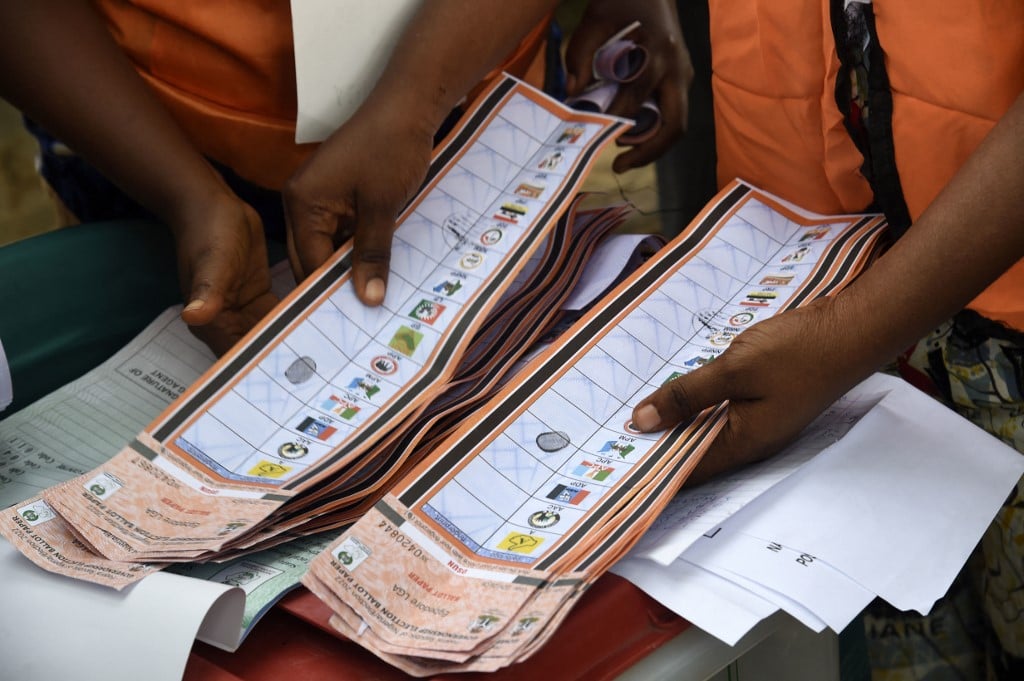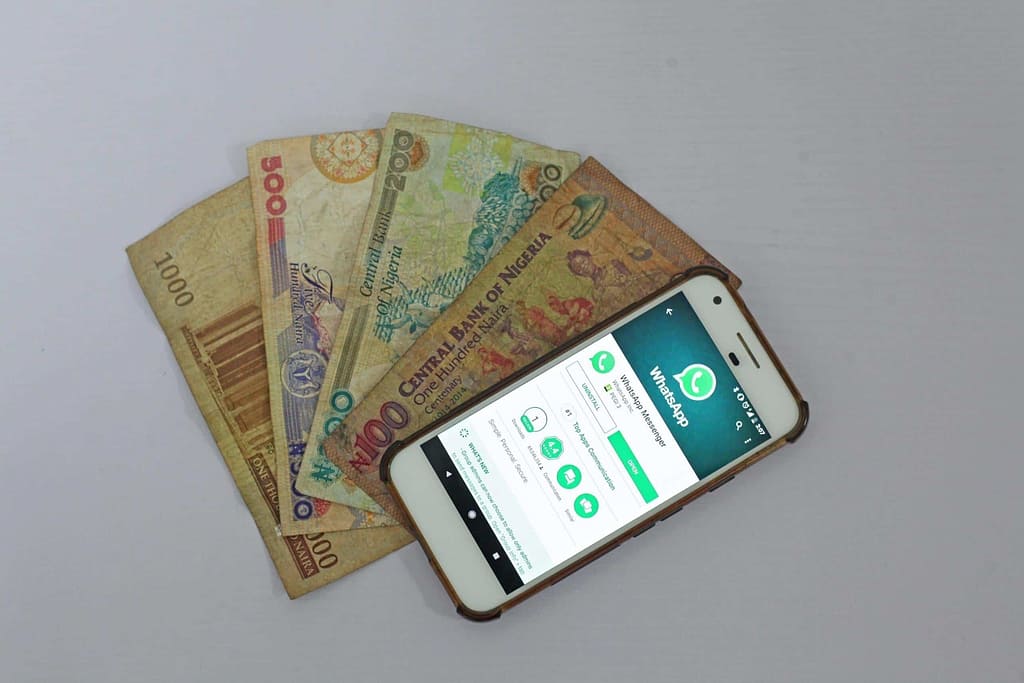Running for elective positions in Nigeria can be an expensive affair. One major party early this year set the price of a presidential nomination form at N100 million (US$230,000).
In the 2015 presidential election, the two main parties – the All Progressives Congress (APC ) and the Peoples Democratic Party (PDP) – ran up a N11.6 billion bill in campaign expenses (about $59.1 million at the exchange rate then).
At the next election in 2019, the two parties easily breached the N1 billion cap provided for by electoral law, according to the Independent National Electoral Commission (Inec), which runs elections in Nigeria.
Campaigning for the 2023 presidential and national assembly elections got underway in September 2022, with 18 candidates eying the top seat. The frontrunners are the governing APC’s Bola Tinubu, former vice president Atiku Abubakar of the PDP, Peter Obi of the Labour Party and Rabiu Kwankwaso of the New Nigeria Peoples Party (NNPP).
(For more, read our factsheet on Nigeria’s pivotal 2023 general elections.)
Questions have been asked about where the parties and politicians will get their campaign spending money from, expected to be in the billions of naira for some candidates.
This explainer answers some key questions about campaign financing.
1. What does the law say about campaign funding?
In February 2022, president Muhammadu Buhari, who is leaving office after the 2023 elections, signed an improved electoral law that was years in the making. The Electoral Act 2022 has a number of guidelines on campaign funding.
Some of these include:
- Political parties may not hold any funds outside of Nigeria or keep funds sent to them from outside the country.
- Political parties have to keep accurate records and make these available to Inec on request.
- The elections agency must make these audited returns available for the public to inspect.
- Parties must publish their audited returns in at least two national newspapers within six months of the election.
2. What are the limits?
The new law raised the total amount a presidential candidate could spend on elections from N1 billion ($2.3 million at current rates) to N5 billion ($11.5 million).
Legislators had argued the previous figure was “not realistic”, with many candidates often breaching the limit without sanctions.
The maximum donation to a party from an individual or organisation is, under the new law, pegged at N50 million (about $115,511), up from N10 million.
Other election expense ceilings are:
- N1 billion ($2.3 million) for governor races.
- N100 million ($231,000) for senatorial and N70 million ($162,000) for house of representatives races.
- N30 million ($69,306) for state assembly and local council chairperson campaigns.
- N5 million ($11,551) for councillor races.
Parties are also not allowed to accept or keep anonymous contributions.
3. Have political parties been observing the limits?
According to mainstream media reports, political parties have often failed to submit their audited financial reports, even under the previous electoral law.
Several parties – 17 according to one report – have been guilty of this, including all four parties seen as having the best chance of winning the 2023 election.

In October 2022 the Premium Times detailed its unsuccessful attempts to have Inec comment on why it had not sanctioned offenders, despite confirming breaches by political parties.
Ayo Olukotun is a political scientist and media scholar and professor of political science at Olabisi Onabanjo University in Ogun state, southwestern Nigeria. He has written on the influence of money in Nigeria’s democracy.
He told Africa Check that while reliable information on the issue was difficult to obtain, it was “unlikely” parties have been observing the limits set out by the law.
“As far as I know, nobody has been apprehended and no party has been sanctioned [by Inec] for exceeding the stipulated amounts for campaign spending.
“It is either because they turn a blind eye to it, or they don’t have the technology or techniques to do the monitoring. Developed countries have mechanisms to monitor spending … but I don’t think we have gotten to that stage to monitor parties effortlessly.”
Olukotun said for the law to work as intended both parties and Inec would need to cooperate on the issue. Inec was also appointed by the ruling party and would therefore feel beholden to it, he said, when asked what other challenges the agency faced in implementing the law.
What was the significance of Inec not sticking to or making sure parties adhered to the regulations?
“The implication is that parties will continue to spend what they want to spend, depending on the size of their pocket. It then means that what the law was meant to achieve, which is minimising money politics, the influence of money on the political process, would be defeated. [The law] would not achieve its objective.”
4. What are the penalties for exceeding limits?
According to the law, candidates who knowingly exceed the spending limits imposed by the elections agency commit an offence. They are liable, if convicted, to a fine of 1% of the limit amount, or 12 months imprisonment.
For a presidential candidate, this 1% would be N50 million.
A person who knowingly donates more than N50 million to a party’s campaign can be fined up to N500,000 ($1,155) or imprisoned for nine months, or both, if found guilty.
The country’s anti-corruption agency, the Economic and Financial Crimes Commission, says it is working with Inec and other relevant agencies to monitor campaign finances.
But Nigerian media say elections officials have struggled to impose penalties.
5. How can you donate to a political party?
Many fundraising platforms exist. Jide Ojo, a public affairs analyst, said GoFundMe was one option for parties to raise campaign funding.
Other examples were donate-ng, NaijaFund and Quickraiz.
All these are crowdfunding, whereby small amounts from many individuals are collected to fund a specific goal. (Note: See question 7 for more on the implications of crowdfunding for Nigerian political parties.)
One could also use short messaging services, Ojo said. To make payments through this mode, supporters simply text a number.
Ringtones, which are popular in Nigeria, are another option. When supporters download a candidate’s ringtone, they contribute to their campaign.
6. Can you donate to a candidate from abroad?
In October 2022, Inec chair Prof Mahmood Yakubu warned political parties about receiving funds from abroad. Parties should not collect donations from foreign countries, he said.
The rule has seemed geared towards protecting national sovereignty and reducing the risk of elected officials being beholden to foreign interests, though some have pointed out there are still gaps in the law.
Some commentators have also cited the danger of foreign money reducing elections to the “will of the highest bidder or the richest political parties”.
But with a sizable Nigerian diaspora, the topic remains controversial. The government says receiving campaign funds from Nigerians outside the country is illegal.
Some lawyers have argued that the law applies only to political parties and not candidates or other campaign platforms.
7. Can a political party crowdfund?
In October 2022 Peter Obi, the Labour Party’s presidential candidate, launched a crowdfunding portal for Nigerians in the diaspora, triggering debate.
Abdul Mahmud, a Nigerian-British lawyer, social critic and columnist, told Africa Check that “there’s nothing in the 1999 constitution, with specific regards to section 225(3), that bars political parties from crowdfunding”.
“What the constitution specifically prohibits is political parties seeking foreign funding or holding any funds or assets abroad. The constitution bans foreign remittances. So, it is a delicate line to tread if parties choose to crowdfund and some donations come from abroad. However, donations from crowdfunding which are made by Nigerians abroad through their local banks don’t offend the law.”
Mahmud said “citizens can donate to parties, but such donations must not go beyond the N50 million cap fixed by section 90 of the Electoral Act 2022.”
8. What can political parties do with donations?
The fate of donations to parties is another concern.
Sheriffdeen Tella, a professor of economics at the Olabisi Onabanjo University, Ago-Iwoye in southwest Nigeria, told Africa Check the money was meant for campaigns and should be properly accounted for.
“I would have suggested that such money be sent to a pool arranged by each party and distributed by the party in an arranged manner,” he said, but highlighted the risks of looting, unfair distribution or delays in disbursing.
Tella said candidates could be asked to contribute some of their donations to their parties to help them campaign.

